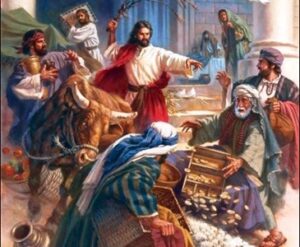 It is important to note at the outset of this particular reading just who it is that Jesus is addressing. Luke says: “Jesus told this parable to some who were convinced of their own righteousness and despised everyone else.”
It is important to note at the outset of this particular reading just who it is that Jesus is addressing. Luke says: “Jesus told this parable to some who were convinced of their own righteousness and despised everyone else.”
But, then there’s this. Elsewhere in Scripture, Proverbs tells us: “To do righteousness is more acceptable to the Lord than sacrifice” and “Blessings are on the head of the righteous.” Turning to Isaiah we read: “The work of righteousness will be peace, and the effect of righteousness, quietness and assurance forever.
So, why does Jesus seem to be criticizing the righteous one? One little word makes the difference. Jesus is talking to the self-righteous; those who trust in themselves. They’re a little too sure they are right and anyone who thinks differently must be wrong. They (or is it we?) are so full of self that there’s little room for God’s grace to filter in.
It’s interesting when you think about it. Everything the Pharisee says is true. He has set himself apart from others by his faithful adherence to the law. He is, by the standards of his day, a righteous man. It isn’t that the Pharisee is speaking falsely, but rather that the Pharisee misses the true nature of his blessing. As Luke says, he has trust in himself. His prayer of gratitude may be addressed to God, but it is really about himself. He credits his righteousness entirely to his own actions.
The tax collector, on the other hand, does not even raise his eyes to heaven. He knows that he possesses no means by which to claim righteousness. He declares he has done nothing of merit. So, he stands back, hardly daring to approach the Temple, and throws himself on the mercy of the Lord. He seems not so much humble as desperate. He stakes his hope entirely on the mercy of God.
At the end of the day, the Pharisee will leave the Temple and return to his home the same virtuous, honorable man he was when he came to the temple. That hasn’t changed. The Pharisee’s mistake, as Scott Peck says, is that he thinks that whenever he wants, he can pull “God out of his hip pocket.” On the other hand, the tax collector will go back to his home exalted in God’s eyes because he humbled himself.
If you’re spiritually alive, and give credit where credit is due, you’re going to love this take on the parable. If you’re spiritually dead, you won’t even want to hear it. If you’re spiritually curious, there is still hope!
A Church goer wrote a letter to the editor of his hometown newspaper and complained that it made no sense to him at all to go to church every Sunday. He wrote: “I’ve gone for 30 years now, and in that time I have heard something like 3,000 sermons, but for the life of me, I can’t remember a single one of them. So, it’s been a waste of my time on my part and on the part of homilists who are wasting their time by giving sermons at all”.
This started a real controversy in the “Letters to the Editor” column. Much to the delight of the editor, it went on for weeks until someone wrote a real clincher: “I’ve been married for 30 years now. In that time my wife has cooked some 32,000 meals. But, for the life of me, I cannot recall the entire menu for a single one of those meals. But I do know this: they all nourished me and gave me the strength I needed to do my work. If my wife had not given me those meals, I would be physically dead today.”
We might say: I’ve been in community x number of years. In that time, I’ve been nourished and supported by my Sisters thousands of times in hundreds of different ways. But sadly, I can only recall a few, if any, instances in full detail. This much I DO know: without their support my spirit would have withered long ago. Likewise, if I had not gone to Mass and been faithful to my time of private and communal prayer, I would be spiritually dead today!
~by Sister Roberta Bailey, OSB




